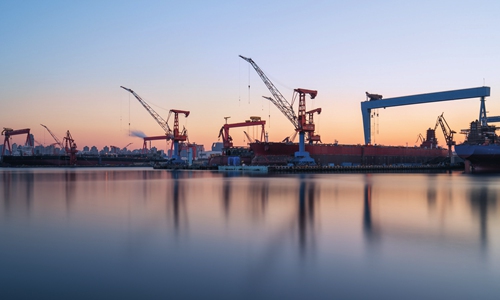HOME >> SOURCE
China adjusts to trade challenges
By Li Xuanmin Source:Global Times Published: 2019/12/2 21:03:41
Nation normalizes external uncertainties, preserves economic resilience

A port in Dalian, China's Northeast Liaoning Province, is one of the busiest ports in the country. Photo: VCG
It's one of the hardest years for China, it's a year full of change, it's the year of 2019.Throughout the year, China's economy has endured a battle that hardly anyone had expected its toughness, showing high level of resilience. China fine tuned its policy, diversified industrial supply chains and deepened partnerships with more countries to successfully sail through a bitter trade war and global meltdown.
Such adjustments are proven to be far more than effective, according to assorted economic data released recently.
"China's strategy has seen a shift this year. At first, policies had been churching out, focusing extensively on cutting costs and stabilizing foreign trade. Then, it dialed inward in boosting consumption. As the year's end nears, China readjusted policy directions to beef up measures in optimizing business environment to sustain and attract investment," Gao Lingyun, an Chinese Academy of Social Sciences expert, told the Global Times over the weekend.
Chinese Premier Li Keqiang called for more efforts to create a market-oriented and law-based business environment, according to a statement released after a State Council executive meeting chaired by Li. The foreign investment law is set to take effect on January 1, 2020.
Experts close to the government told the Global Times China is proceeding in a way to have a plan first and then implement it in a flexible manner. The country's leadership and the general public are accepting the trade war with the US as a given fact and dealing it with a palpable level of calm and confidence.
"At first, China indeed worried and responded passively. But now we're taking the initiative and are comfortable with our own tempo and schedule," Gao said.
Under a governing philosophy of preserving economic resilience while normalizing higher tariffs, China pursued goals step by step steadfastly.
"China has an institutional edge over other Western countries including the US. Unlike their political system, which is crowded by conflicting opinions, we work together and we're united - this is our biggest advantage," Gao said. "The longer the trade war last, the bigger advantage we have in hands."
In November, China's Caixin/Markit Manufacturing Purchasing Managers' Index rose to 51.8 from 51.7 in October, the fastest expansion since December 2016.
The unexpected expansion reflects the revival of industrial output and robust domestic economic growth underpinned by rising and consumption trends. It provides a contrasting reality to US President Donald Trump's poor characterization on Chinese economy.
Industrial chain diversification
The trade war, which Trump initiated, with China is in its 18th month now, despite negotiation. Huawei has been one of the US government's targets in its tech blockade of China. The blacklisting cut off crucial US components suppliers to the Chinese company.
Huawei responded by launching its self-developed operating system HarmonyOS in August, providing a vivid example of how China is scaling up efforts to reduce reliance on US in the long term.
Exporters based in Yiwu, East China's Zhejiang Province, the world's largest wholesale market, told the Global Times that diversification in markets had been underway since last year, under which orders to other countries in Europe and along the Belt and Road Initiative are taking shape.
Ying Daijun, chairman of Shifeng Decorative Lighting Co in Yiwu, East China's Zhejiang Province, told the Global Times that the company's light exports to US now account for a negligible share of overall exports, while exports to India have soared to account for 40 percent of total revenue, the largest share.
The US was the company's largest export destinations last year. "The US retailers are more desperate to call for the removal of tariffs than we are. And we're fully prepared if trade conflicts further escalate," Ying said.
RELATED ARTICLES:
Posted in: INDUSTRIES,ECONOMY